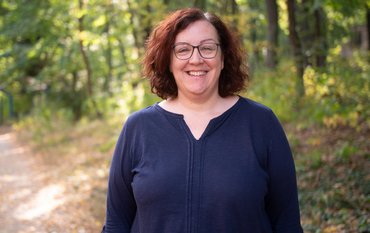Geothermal energy can bring about a heat turnaround! This was the message of the GFZ in its own session at the Berlin Energy Days 2022. Among other things, key messages from the joint "Roadmap Deep Geothermal Energy for Germany" were presented.
Half of the municipal heating in Germany is to come from climate-neutral sources by 2030. Deep geothermal energy can make a major contribution to this goal of the German government, because it provides local energy consistently and independently of weather conditions and occupies little space in settlements. Market-ready technologies are available, but there is a need for action at many levels for broader use.
Under the title 'Geothermie kann Wärmewende' (Geothermal energy can bring about a heat turnaround), the German Research Centre for Geosciences together with the German Geothermal Energy Association invited participants to a lecture session on 2 May 2022 as part of the Berlin Energy Days 2022 and shed light on current framework conditions and projects. The number and range of participants showed the great interest in the topic in the current energy discussion.
Ingo Sass, head of the Geoenergy Section at the GFZ German Research Centre for Geosciences, introduced the session: "Geothermal energy means independence and decentralisation of municipal heat supply. It can help to secure future supply from domestic sources and thus reduce the vulnerability of the energy supply. In addition to investments in key technologies and accelerated approval processes, this requires above all the strengthening of social awareness and the participation of citizens."
The programme of the GFZ session can be found on the website of the Berlin Energy Days - including download option.
The individual presentations at a glance
"Roadmap Deep Geothermal Energy”
Ingo Sass presented excerpts from the "Roadmap Deep Geothermal Energy for Germany", which was published in February 2022 by institutions of the Helmholtz Association and the Fraunhofer-Gesellschaft. The strategy paper shows that deep geothermal energy has a market potential in Germany that opens up expansion targets of more than a quarter of Germany's annual heat demand (more than 300 TWh of annual work or 70 GW of installed capacity). "Without geothermal energy, decarbonisation of the heating sector in Germany will not be possible. The natural underground heat potentials are available for this in most urban areas," says Sass. "We are implementing our research results in applied, industrial and demonstration projects, showing society the safe and large-scale applicability of geothermal energy provision."
Presentation Sass for download
Potential of district heating
District heating networks
The heat transition is crucial for the success of the energy transition. District heating has a central role to play in the heat transition through the expansion and densification as well as the linking of efficient heating networks with climate-friendly and climate-neutral heat sources. The presentation "Heat grids as a component of the energy turnaround" by Dr. Bernd Wagner, AGFW-Projektgesellschaft für Rationalisierung, Information und Standardisierung mbH, gave an overview and showed potentials and possibilities.
Presentation Wagner for download
The City of Munich as an example for district heating
The city of Munich plays a pioneering role nationally in the expansion of deep geothermal energy. The special geological conditions in the Bavarian Molasse Basin help the region to develop geothermal district heating projects in a particularly dynamic way. Munich, for example, aims to meet its district heating needs in a CO2-neutral manner by 2040 at the latest, predominantly from geothermal energy. The development of geothermal potential in inner-city areas poses new challenges for planners and operators of geothermal plants. In the presentation "Urban Drilling - Prerequisites for Geothermal Drilling in Inner-City Areas", Bernhard Betzl from Stadtwerke München (Munich Municipal Utilities) highlighted these aspects using a practical example.
Presentation Betzl for download
Deep geothermal energy in France
France has been successfully using deep geothermal energy for a long time, especially in the heating sector. The presentation by Mélanie Davaux, Geofluid, gave an overview of the state of geothermal heat supply in France. According to this, 54 plants currently generate geothermal heat in the Paris basin and cover 64 percent of the heat supply in this region. By 2028, 4 to 5.2 TWh of heat per year are to be produced in France using deep geothermal energy.
+++++++++++++++++++++++++++++++++++
Background information on the "Roadmap Deep Geothermal Energy for Germany”
Together with Helmholtz colleagues from the Karlsruhe Institute of Technology (KIT) and the Helmholtz Centre for Environmental Research (UFZ) as well as from institutions of the Fraunhofer-Gesellschaft, the GFZ has developed the roadmap. The strategy paper is intended to provide all stakeholders with the necessary information on the geothermal heat supply, the versatility of the heat market, and the technological realisation of the heat transition. The aim is to provide recommendations for action to exploit the potential of geothermal energy for a climate-neutral heat supply and thus make the heat supply in Germany more resilient.
For download: "ROADMAP DEEP GEOTHERMAL ENERGY FOR GERMANY – Recommendations for action for politics, business and science for a successful heat transition" (German only)
Scientific contact:
Prof. Ingo Sass
Section head 4.8 Geoenergy
Helmholtz Centre Potsdam
GFZ German Research Centre for Geosciences
Telegrafenberg
14473 Potsdam
Phone: +49 331 288-27598
Email: ingo.sass@gfz-potsdam.de
Media contact:
Josef Zens
Head of Public and Media Relations
Helmholtz Centre Potsdam
GFZ German Research Centre for Geosciences
Telegrafenberg
14473 Potsdam
Phone: +49 331 288-1040
Email: josef.zens@gfz-potsdam.de


![[Translate to English:] View over the roofs of Berlin. Tower of Berlin in the background.](/fileadmin/_processed_/9/3/csm_2022_05_10_Berlin_0027_PSpalek_0f60193545.jpeg)








![[Translate to English:] [Translate to English:] Abror Gafurov von dem Schriftzug "Welcome to Azerbaijan" und den UN und COP Logos](/fileadmin/_processed_/2/5/csm_2024_11_Baku_COP29_Abror_Gafurov_1042faec82.jpeg)


![[Translate to English:] Martin Herold standing in front of the library on the Telegrafenberg](/fileadmin/_processed_/c/d/csm_Martin_Herold_d385ee4dd9.jpeg)
![[Translate to English:] Many people are listening to a presentation in the GFZ lecture hall.](/fileadmin/_processed_/c/a/csm_1_Bild1_hell_b9c0e9f5ed.jpeg)






![[Translate to English:] Both scientists sitting on stools in front of a wall of books in the Telegrafenberg library](/fileadmin/_processed_/6/6/csm_Buiter_Castell_DORA_4_e87cb1ea18.jpeg)
![[Translate to English:] Gruppenbild mit 4 Personen](/fileadmin/_processed_/8/d/csm_20241017_GFZ-Emmerman-Medal-005_web_reinhardtundsommer_21a414fa4a.jpeg)






![[Translate to English:] Ice landscape with five red tents](/fileadmin/_processed_/8/9/csm_Zeltlager_auf_dem_Eis_Urheberin_Jenine_McCutcheon_5ced2d523b.jpeg)


